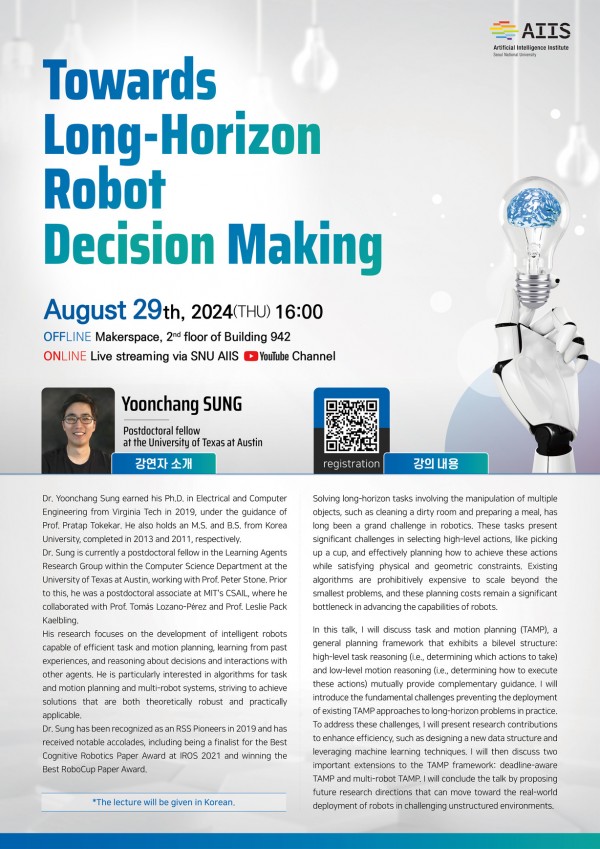Events Towards Long-Horizon Robot Decision Making
본문
Title Towards Long-Horizon Robot Decision Making
Content Solving long-horizon tasks involving the manipulation of multiple objects, such as cleaning a dirty room and preparing a meal, has long been a grand challenge in robotics. These tasks present significant challenges in selecting high-level actions, like picking up a cup, and effectively planning how to achieve these actions while satisfying physical and geometric constraints. Existing algorithms are prohibitively expensive to scale beyond the smallest problems, and these planning costs remain a significant bottleneck in advancing the capabilities of robots.
In this talk, I will discuss task and motion planning (TAMP), a general planning framework that exhibits a bilevel structure: high-level task reasoning (i.e., determining which actions to take) and low-level motion reasoning (i.e., determining how to execute these actions) mutually provide complementary guidance. I will introduce the fundamental challenges preventing the deployment of existing TAMP approaches to long-horizon problems in practice. To address these challenges, I will present research contributions to enhance efficiency, such as designing a new data structure and leveraging machine learning techniques. I will then discuss two important extensions to the TAMP framework: deadline-aware TAMP and multi-robot TAMP. I will conclude the talk by proposing future research directions that can move toward the real-world deployment of robots in challenging unstructured environments.
In this talk, I will discuss task and motion planning (TAMP), a general planning framework that exhibits a bilevel structure: high-level task reasoning (i.e., determining which actions to take) and low-level motion reasoning (i.e., determining how to execute these actions) mutually provide complementary guidance. I will introduce the fundamental challenges preventing the deployment of existing TAMP approaches to long-horizon problems in practice. To address these challenges, I will present research contributions to enhance efficiency, such as designing a new data structure and leveraging machine learning techniques. I will then discuss two important extensions to the TAMP framework: deadline-aware TAMP and multi-robot TAMP. I will conclude the talk by proposing future research directions that can move toward the real-world deployment of robots in challenging unstructured environments.
Date / Time August 29th, 2024 (Thu) 16:00
Place Makerspace, 2nd floor of Building 942, and online (Live streaming via SNU AIIS YouTube channel)
Attendances AIIS faculty, students, and pre-registered external attendees
Speaker Yoonchang SUNG, Postdoctoral fellow at the University of Texas at Austin
Place Makerspace, 2nd floor of Building 942, and online (Live streaming via SNU AIIS YouTube channel)
Attendances AIIS faculty, students, and pre-registered external attendees
Speaker Yoonchang SUNG, Postdoctoral fellow at the University of Texas at Austin
Details Dr. Yoonchang Sung earned his Ph.D. in Electrical and Computer Engineering from Virginia Tech in 2019, under the guidance of Prof. Pratap Tokekar. He also holds an M.S. and B.S. from Korea University, completed in 2013 and 2011, respectively.
Dr. Sung is currently a postdoctoral fellow in the Learning Agents Research Group within the Computer Science Department at the University of Texas at Austin, working with Prof. Peter Stone. Prior to this, he was a postdoctoral associate at MIT's CSAIL, where he collaborated with Prof. Tomás Lozano-Pérez and Prof. Leslie Pack Kaelbling.
His research focuses on the development of intelligent robots capable of efficient task and motion planning, learning from past experiences, and reasoning about decisions and interactions with other agents. He is particularly interested in algorithms for task and motion planning and multi-robot systems, striving to achieve solutions that are both theoretically robust and practically applicable.
Dr. Sung has been recognized as an RSS Pioneers in 2019 and has received notable accolades, including being a finalist for the Best Cognitive Robotics Paper Award at IROS 2021 and winning the Best RoboCup Paper Award.
Dr. Sung is currently a postdoctoral fellow in the Learning Agents Research Group within the Computer Science Department at the University of Texas at Austin, working with Prof. Peter Stone. Prior to this, he was a postdoctoral associate at MIT's CSAIL, where he collaborated with Prof. Tomás Lozano-Pérez and Prof. Leslie Pack Kaelbling.
His research focuses on the development of intelligent robots capable of efficient task and motion planning, learning from past experiences, and reasoning about decisions and interactions with other agents. He is particularly interested in algorithms for task and motion planning and multi-robot systems, striving to achieve solutions that are both theoretically robust and practically applicable.
Dr. Sung has been recognized as an RSS Pioneers in 2019 and has received notable accolades, including being a finalist for the Best Cognitive Robotics Paper Award at IROS 2021 and winning the Best RoboCup Paper Award.
The lecture will be given in Korean.

댓글목록
등록된 댓글이 없습니다.




